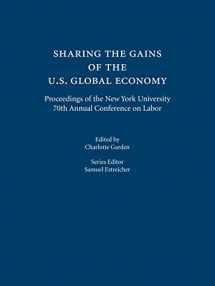
Sharing the Gains of the U.S. Global Economy: Proceedings of the New York University 70th Annual Conference on Labor
Book details
Summary
Description
What will our work lives look like in the future? Will workers see increased leisure time and greater social equality? Or will the "gigification" of work continue, with workers scrambling for ever-more-scarce jobs and resources? This book―which includes chapters by leading academics, policy makers, and lawyers―grapples with these topics. Using a variety of methodological approaches, chapter authors illuminate how questions about the "future of work" are really questions about labor and employment law; tax law; automation; redistribution; and more.
The book is divided into two sections. The first is focused on potential barriers to an economy that works for most people, including work law, trade policy, and automation. The second part is solution-focused, and authors explore a variety of specific policy and legal responses; these include changes to worker classification law, wage insurance, universal basic income, and guaranteed public employment. Readers will find that chapter authors often disagree with each other about what should be done, reflecting the current state of the high-stakes debate about the future of work.


We would LOVE it if you could help us and other readers by reviewing the book
Book review



